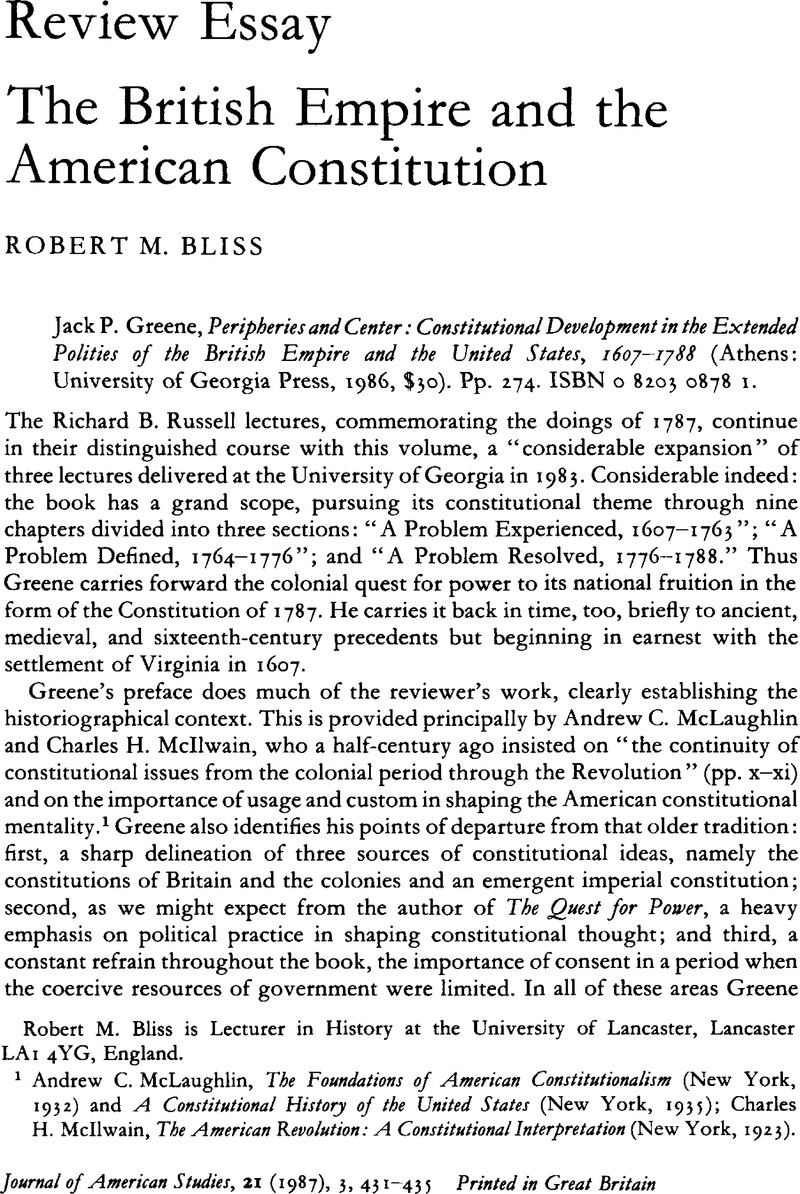Article contents
The British Empire and the American Constitution
Published online by Cambridge University Press: 16 January 2009
Abstract

- Type
- Review Essay
- Information
- Copyright
- Copyright © Cambridge University Press 1987
References
1 McLaughlin, Andrew C., The Foundations of American Constitutionalism (New York, 1932)Google Scholar and A Constitutional History of the United States (New York, 1935)Google Scholar; Mcllwain, Charles H., The American Revolution: A Constitutional Interpretation (New York, 1923).Google Scholar
2 Wood, , The Creation of the American Republic, 1776–1787 (Chapel Hill, 1969)Google Scholar. In this context, Greene also frequently cites the work of Onuf, Peter S., particularly The Origins of the Federal Republic: Jurisdictional Controversies in the United States, 1777–1787 (Philadelphia, 1983).Google Scholar
3 Except for The Quest for Power: The Lower Houses of Assembly in the Southern Royal Colonies, 1689–1776 (Chapel Hill, 1963)Google Scholar, Greene's major contributions have come in small yet influential packages, for instance the excellently crafted documentary collections Settlements to Society: 1584–1763 (New York, 1966)Google Scholar and, with more extensive introductions, Great Britain and the American Colonies, 1606–1763 (New York, 1970)Google Scholar; clarifying and challenging review essays such as “Changing Interpretations of Early American Politics” in Billington, R. A., ed., The Reinterpretation of Early American History…(San Marino, 1966)Google Scholar, “Autonomy and Stability: New England and the British Colonial Experience in Early Modern America”, Journal of Social History, 7 (1974), 171–94Google Scholar and “From the Perspective of Law: Context and Legitimacy in the Origins of the American Revolution”, South Atlantic Quartery, 85 (1986), 56–77Google Scholar; and many articles, the most influential of which is “Political Mimesis: A Consideration of the Historical and Cultural Roots of Legislative Behavior in the British Colonies in the Eighteenth Century”, American Historical Review 75 (1969), 337–67.Google Scholar
4 The most important works by Bailyn relevant to this debate are The Ideological Orgins of the American Revolution (New York, 1967)Google Scholar and The Origins of American Politics (New York, 1968)Google Scholar; but see also Bailyn's appended reply to Greene's “Political Mimesis”, already cited.
5 In his “Preface” Greene gives Bailyn (with Gordon Wood) handsome credit for establishing our understanding of revolutionary political ideology; but in an interestingly worded qualifier (p. x) Greene notes that “for the years before 1760…neither Bailyn nor Wood gave any systematic attention either to constitutional developments in the colonies or to the changing character of constitutional thought about the nature of the empire”.
6 See Greene's chapter 7, “Disintegration of Empire, 1773–1776”, especially pp. 144–50, where he refers principally to Black, Barbara A., “The Constitution of the Empire: The Case for the Colonists”, University of Pennsylvania Law Review, 124 (1976)CrossRefGoogle Scholar, several works by Reid, John P., including In Defiance of the Law: The Standing Army Controversy, the Two Constitutions, and the Coming of the American Revolution (Chapel Hill, 1981)Google Scholar, and Grey, Thomas C., “Origin of the Unwritten Constitution: Fundamental Law in American Revolutionary Thought”, Stanford Law Review, 30 (1978).CrossRefGoogle Scholar
7 Metropolitan versus provincial dualism still rules seventeenth-century imperial history although historians now give it rather differing roots. See for instance recent works by Lovejoy, David S., The Glorious Revolution in America (New York, 1972)Google Scholar, Webb, Stephen Saunders, The Governors-General: The English Army and the Definition of the Empire, 1569–1681 (Chapel Hill, 1979)Google Scholar and Sosin, J. M., English America and the Revolution of 1688: Royal Administration and the Structure of Provincial Government (Lincoln, 1982).Google Scholar
8 See Wilson's, Charles characterization of the English navigation system as “the welfare of Leviathan” in England's Apprenticeship, 1603–1763 (London, 1965), 63Google Scholar. The general theme of the rise of state power is examined by Plumb, J. H., The Origins of Political Stability: England, 1675–1725 (Boston, 1967)CrossRefGoogle Scholar and Western, J. R., Monarchy and Revolution: The English State in the 1680s (London, 1972).CrossRefGoogle Scholar
9 Pole, J. R. stresses this capacity for extension as crucial to the success of colonial assemblies in Political Representation in England and the Origins of the American Republic (New York, 1966)CrossRefGoogle Scholar. The creation of town and county institutions was also of vital importance. See for instance Billings, Warren, “The Growth of Political Institutions in Virginia, 1634 to 1676,” WMQ 3rd ser., 31 (1974), 225–42CrossRefGoogle Scholar; Daniels, Bruce C., ed., Town and Country: Essays on the Structure of Local Government in the American Colonies (Middletown, 1978)Google Scholar; and Konig, David Thomas, Law and Society in Puritan Massachusetts: Essex Country, 1629–1692 (Chapel Hill, 1979)Google Scholar
10 A model study along these lines is provided by Johnson, Richard in Adjustment to Empire: The New England Colonies, 1675–1715 (New Brunswick, 1981)Google Scholar, but see also Olson's, Alison G. suggestive Anglo-American Politics, 1660–1775: The Relationship between Parties in England and Colonial America (Oxford, 1973).Google Scholar
11 Greene, , in his Introduction to Great Britain and the American Colonies, p. xiii.Google Scholar
12 It is worth noting that Greene rarely refers to historians of the Revolution who have been principally concerned with the social and economic roots of political conflict. For instance, Merrill Jensen is cited three times, but only where his work directly involved jurisdictional issues between states or between states and the national government (pp. 156, 160, 173).
- 1
- Cited by




